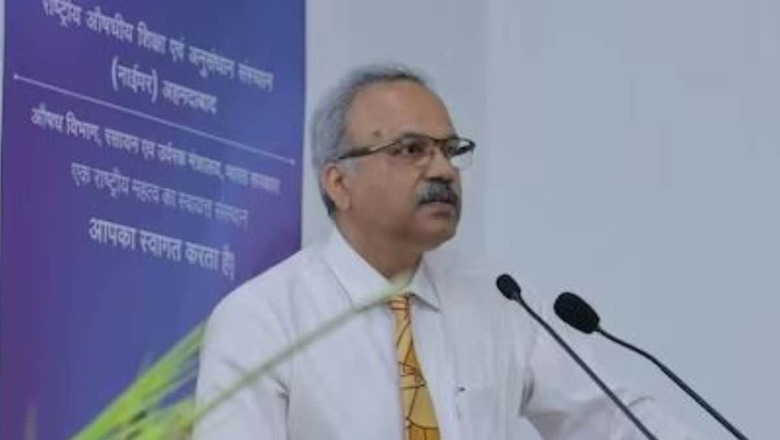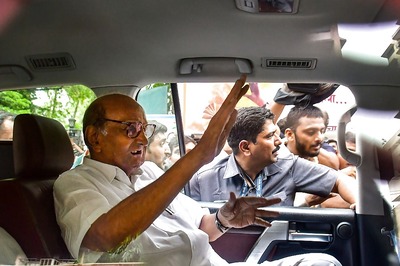
views
Throughout the year, DCGI Rajeev Singh Raghuvanshi made headlines for his several moves, ranging from aggressive raids on pharmaceutical units nationwide, revoking production licenses, introducing Schedule M, guiding micro and medium-sized pharmaceutical companies, to delivering a resolute message to pharma units to either upgrade or risk shutdowns.
Trouble started in October 2022 when India was accused of exporting contaminated medicine to The Gambia, which led to the deaths of several children. However, this was just the beginning.
The situation escalated in 2023, starting with reports of deaths caused in Uzbekistan due to made-in-India medicines, followed by several complaints from countries like the United States, Marshall Islands, Micronesia, and Sri Lanka.
The accusations cast a negative light on India’s drug regulatory agency — Central Drugs Standard Control Organization (CDSCO) — significantly tarnishing the reputation of India as the global pharmaceutical hub.
Coincidentally, this came at a time when India was on the brink of bidding farewell to the former DCGI and ushering in a new appointee. The position was challenging, given the scrutiny of India’s response to global accusations.
In February, India appointed Raghuvanshi, the first DCGI from the corporate world who boasted of stints at Ranbaxy and Dr. Reddy’s among others.
Split Verdict?
While the lobby of foreign drugmakers praised the role played by CDSCO and DCGI in the last one year, the lobbies representing domestic drugmakers refused to or refrained from commenting.
According to Anil Matai, director general of the Organisation of Pharmaceutical Producers of India (OPPI) — the lobby representing top foreign drugmakers including Novartis, Abbott, Sanofi and Roche — CDSCO has emerged as “a beacon of excellence in the regulatory landscape” under the stellar leadership of Raghuvanshi.
Appreciating the moves taken by Raghuvanshi, Matai said: “The unwavering commitment to upholding quality standards through rigorous quality checks and Schedule M training reflects a proactive stance in ensuring the quality and efficacy of pharmaceutical products in India. This dedication is not just a regulatory necessity but a commitment to the well-being of the patient.”
He added: “The prompt implementation of QR codes is a noteworthy example, demonstrating both agility and a deep understanding of industry needs. Furthermore, we applaud the decision to overhaul drug regulations and work towards framing the Drugs, Medical Devices, and Cosmetics Bill, a crucial step towards upgrading and streamlining the regulatory framework.”
Dr Viranchi Shah, national president of the Indian Drug Manufacturers’ Association, said: “IDMA appreciates DCGI Dr Raghuvanshi for his support to the industry during the first year of his tenure. IDMA and the Indian Pharma thank him for his intervention on the National CGMP day that has helped us to sensitise almost 20,000+ professionals across India on the importance of GMP as a way to quality. He has accorded proactive and balanced support on important regulatory reforms such as Schedule M and proposed Drugs Bill, and engaging with IDMA and other associations on various training and interaction programs with the industry across India. He has done a commendable work on several fronts like Industry support, patient safety and product quality.
“He has also strengthened the Indian Pharma globally through participation in various agreements and MoUs with international regulators and agencies. He has worked hard for global recognition of IP. It was the year of CDSCO leadership. IDMA congratulates him on completing his first year as the DCGI.”
The official spokesperson of Indian Pharmaceutical Alliances — the largest lobby of domestic drugmakers — refused to comment.
Raids, Upgrading Schedule M, QR Codes & More
Within one month of joining, Raghuvanshi took charge of ongoing risk-based inspections across India.
While conducting a special drive to investigate the manufacturing of Not Standard Quality (NSQ) drugs or spurious quality drugs in India, CDSCO raided drugmakers in 20 states across India after identifying 203 pharmaceutical companies.
Facing scrutiny ranging from licence cancellations to the closure of manufacturing plants, drugmakers received a clear message to enhance their manufacturing standards.
As part of this regulatory overhaul, stringent measures have been implemented, starting with the upgrading of Schedule M standards on August 2. This move provides a grace period for smaller companies, allowing them a year to transition, while larger enterprises are given six months.
The idea is to make manufacturing standards on par with WHO-Good Manufacturing Practices (GMP) standards. This move will help Indian MSME companies upgrade their units.
According to government data, there are around 10,500 manufacturing units in the country of which at least 8,500 are in the category of micro, small and medium enterprises (MSME). Of these, 2,000 are approved by the World Health Organization and certified as WHO-GMP (Good Manufacturing Practices).
On August 1, CDSCO introduced a system of barcoding on the top-selling 300 medicine brands, including Shelcal, Calpol, Dolo, Allegra and Meftal Spas, which will carry QR or bar codes to verify their authenticity. The move aims at weeding sub-standard and counterfeit medicines out of the system.
DCGI maintained continuous messaging to improve quality. Maintaining the standard of made-in-India medicines is of ‘paramount importance’, the country’s apex drug regulator has told states and Union Territories amid fixing quality issues of the Indian pharmaceutical industry. Many such advisories and letters were shot to states and UTs this year.
Attempts to Cleanse the Market of ‘Cough Syrups’
In an attempt to prevent exports of poor-quality cough syrups from denting India’s reputation, DCGI decided to put a system of checks for the finished syrups at government laboratories before the final dispatch.
News18 first reported the news break on May 16. On May 22, a notification was issued by the Ministry of Commerce and Industry, Directorate General of Foreign Trade, revising the policy where exports are allowed only after the production of a ‘certificate of analysis’ by the exporter. The changes will be effective from June 1, the notification said
The proposal explained that the exporter will have to produce the “certificate of analysis” of the batches being exported from one of the approved labs along with other documentation to release the consignment for export.
Accepting the proposal, the government amended the Foreign Trade Policy, 2023, related to the export of cough syrups.
After India decided to put in a system of checks at government laboratories before exporting cough syrups, DCGI asked state laboratories and inspectors to test the finished products on “top priority” and issue the “test report at the earliest”.
On December 5, DCGI sent a reminder asking drugmakers to prioritise producing high-quality products free of ‘contamination’, with special mention of cough syrups.
A day later, the makers of the chemical Propylene Glycol — used in making cough syrups — were put under the scanner across India.
To prevent exports and domestic consumption of poor-quality cough syrups, DCGI alerted inspectors across India to verify the manufacturing of propylene glycol and its supply chain across the country as a matter of “top priority”.
“It is proposed to verify the supply chain and quality of propylene glycol from cough syrup manufacturer to propylene glycol manufacturer or importer to rule out possible quality issues related to diethylene glycol (DEG) and ethylene glycol (EG) and diversion of industrial grade propylene glycol in the pharmaceutical industry,” DCGI wrote in the letter accessed by News18.
Banning FDCs & Action on Codeine-based Cough Syrups
In June, CDSCO banned 14 fixed-dose combination (FDC) medicines after they were found to lack therapeutic relevance — a move which was pending since last many years.
Fixed-dose combinations (FDCs) are medicines that combine more than one drug in a single pill and are also referred to as “cocktail” medicines.
Fixed-dose combination medicines such as Dialex DC, Grilinctus, Codistar, Tedykoff LX and other cocktail cough syrups were taken off the shelves.
Also, pholcodine-based cough syrups and cold-flu medicines will come with a warning. The Indian drug regulatory agency is seeking an expert opinion on the possibility of withdrawing the products from the market, similar to the steps taken by several other countries. Opioid-based cough suppressant pholcodine has come under the scanner in India after WHO raised an alarm in March.
Moreover, for use among kids and infants below four years, the drug regulator decided to ban the use of a popular anti-cold cocktail medicine combination among infants and children below four years of age.
Handholding of Medium & Small Pharma Companies
The year commenced with an unequivocal message: either enhance manufacturing quality or face closure.
With small and medium-sized pharmaceutical companies facing increased scrutiny from global regulators due to recurring lapses, the CDSCO started handholding these drugmakers. Also, the adoption of Schedule M is not easy and MSME needs guidance.
The government designed “capacity-building workshops” to assist drugmakers in navigating the regulatory requirements effectively.
The concept of the workshop was proposed by the Ministry of Commerce and Industry’s pharmaceutical export wing, Pharmexcil, which has been working with the Ministry of Health and Family Welfare to improve the good manufacturing practices of MSME drugmakers.




















Comments
0 comment